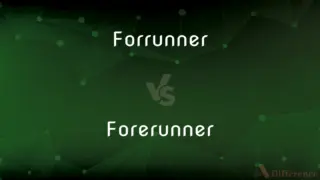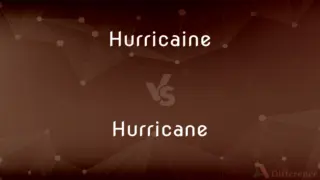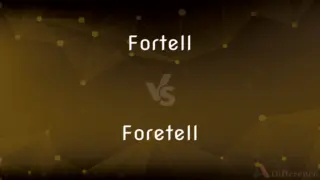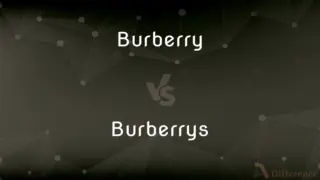Mabye vs. Maybe — Which is Correct Spelling?
Edited by Tayyaba Rehman — By Fiza Rafique — Updated on March 20, 2024
"Mabye" is an incorrect spelling, whereas "Maybe," signifying a possibility or perhaps, is the correct form, commonly used to express uncertainty or doubt.

Table of Contents
Which is correct: Mabye or Maybe
How to spell Maybe?

Mabye
Incorrect Spelling

Maybe
Correct Spelling
ADVERTISEMENT
Key Differences
Recall "a" comes before "y" in "Maybe," like in "baby."
Note "a" and "b" are in alphabetical order in the correct spelling.
Remember that “Maybe” is like an abbreviated form of “may be.”
Associate “Maybe” with possibility, focusing on the ‘e’ after ‘b.’
Think of “Maybe” rhyming with “baby” to keep the letter order in mind.
ADVERTISEMENT
How Do You Spell Maybe Correctly?
Incorrect: Mabye we should try a different approach.
Correct: Maybe we should try a different approach.
Incorrect: Mabye we'll have better luck next time.
Correct: Maybe we'll have better luck next time.
Incorrect: I'm not sure, but mabye it will work.
Correct: I'm not sure, but maybe it will work.
Incorrect: She said she might come, mabye around three.
Correct: She said she might come, maybe around three.
Incorrect: Do you think mabye he forgot about our meeting?
Correct: Do you think maybe he forgot about our meeting?
Maybe Definitions
Employed to suggest an alternative.
Maybe we could try this route instead.
A word indicating uncertainty or possibility.
Maybe it will rain tomorrow.
Indicates hesitancy or indecision.
Maybe I’ll join you, I’m not sure yet.
Denotes a gentle suggestion or proposition.
Maybe take a short break before continuing.
Perhaps; possibly
Maybe I won't go back
He was standing maybe 20 or 30 feet away
A mere possibility or probability
No ifs, buts, or maybes
Used to indicate uncertainty or possibility
We should maybe take a different route. Maybe it won't rain.
An uncertainty
There are so many maybes involved in playing the stock market.
An uncertain reply
It's better to receive a fast and honest no than a drawn-out maybe.
Modifies a verb, indicating a lack of certainty: it may be (that)...
Maybe I was imagining it, but I could swear that the dog understood what I was saying.
Perhaps that is true expressing no commitment to a decision or a neutral viewpoint to a statement.
Certainly.
Maybe not the best idea.
Possible; uncertain.
(informal) Something that is possibly true.
(informal) An answer that shows neither agreement nor disagreement.
The results of the poll were inconclusive. We got two yeses, three nos, and four maybes.
(informal) A future event that may or may not happen.
About your raise: it's a big maybe.
Perhaps; possibly; peradventure.
Maybe the amorous count solicits her.
In a liberal and, maybe, somewhat reckless way.
Possible; probable, but not sure.
Then add those maybe years thou hast to live.
Possibility; uncertainty.
What they offer is mere maybe and shift.
By chance;
Perhaps she will call tomorrow
We may possibly run into them at the concert
It may peradventure be thought that there never was such a time
Used to express a condition or prerequisite.
Maybe if you ask nicely, she’ll agree.
Maybe Meaning in a Sentence
I haven't decided yet, but maybe I'll go to the concert.
Maybe you should try talking to him about it.
Maybe we'll get lucky and find a parking spot right away.
Maybe it's better if we take a break and come back to this problem later.
They're not sure, but maybe they'll move next year.
Maybe we can go to the park this afternoon.
He was thinking maybe it's time to start a new hobby.
Maybe if we leave now, we can avoid the traffic.
She said maybe she'd join us later for dinner.
He's not sure, but maybe he'll start his own business.
Maybe we can solve this issue if we work together.
I'm not certain, but maybe I left my keys in the car.
Maybe if we hurry, we can catch the early train.
It looks like rain, but maybe it will clear up by the afternoon.
Maybe it was a mistake to come here so early.
She thinks maybe she'll write a book someday.
Maybe you're right, and we should just ask for help.
I'm not hungry now, but maybe I'll eat something later.
Maybe we should ask for directions.
Maybe we underestimated the difficulty of this project.
She's considering several colleges, but maybe she'll choose the local university.
They're not sure, but maybe they'll adopt a pet.
If we save enough, maybe we can go on a trip next summer.
Maybe we'll see a movie tonight if there's nothing else to do.
Maybe it's time to reconsider our strategy.
Maybe Idioms & Phrases
Maybe, maybe not
Expresses uncertainty about a situation.
Will you be at the party? Maybe, maybe not. I haven't decided.
Maybe not
Used to express a possibility of negation or refusal.
I thought about going for a run, but maybe not since it looks like it's about to rain.
A maybe person
Someone who is indecisive.
He's a maybe person, always hesitating before making decisions.
And maybe
Used to add another possibility or consideration.
We could see a movie, and maybe grab some dinner afterward.
Turn maybe into yes
To change uncertainty into certainty or agreement.
With a bit more persuasion, we might turn maybe into yes.
Maybe so
It might be true; possibly.
You think it's going to rain? Maybe so, but let's hope it stays clear.
Just maybe
Indicates that there is a slight but real possibility.
Just maybe, if we try hard enough, we can make it happen.
Maybe later
Used to suggest that something could happen at a later time.
Do you want to go to the movies? Maybe later, I'm busy right now.
But maybe
Used to introduce a contrasting possibility.
It seems hard, but maybe with a little effort, we can succeed.
Live in a world of maybes
To be constantly uncertain or indecisive.
You can't live in a world of maybes; sometimes, you have to make a choice.
Flip a maybe
To change an uncertain situation into a definite one.
Let's see if we can flip a maybe into a commitment.
If maybe
Used to introduce a conditional possibility.
If maybe we get there early, we'll have time to grab a bite to eat.
Maybe again
Suggests reconsidering something.
You declined the invitation, but maybe again, it could be fun.
Make maybe your friend
To become comfortable with uncertainty.
In this line of work, you have to make maybe your friend and adapt as things change.
Or maybe
Used to introduce an alternative possibility.
We could go hiking, or maybe we could just relax at home.
That's a big maybe
Expresses significant doubt or uncertainty.
Will I go skydiving with you? That's a big maybe.
A maybe day
A day with no definite plans; a day that could go in any direction.
Saturday is a maybe day, so we can decide what to do then.
Maybe is not enough
Expressing the need for certainty or a firm decision.
When it comes to safety, maybe is not enough; we need sure answers.
A maybe mind
A mindset that is open to possibilities and not fixed on a single outcome.
With a maybe mind, you're always open to new opportunities.
Ride the maybe
To remain in an undecided state.
I'm going to ride the maybe a bit longer before I decide.
Common Curiosities
What is the verb form of Maybe?
"Maybe" does not have a verb form as it is an adverb.
What is the root word of Maybe?
The root words of "Maybe" are “may” and “be.”
Which vowel is used before Maybe?
It can be various, depending on context; there's no fixed vowel used before "Maybe."
Why is it called Maybe?
"Maybe" is called so because it's derived from the permission or possibility expressed by "may" and the existential "be."
What is the singular form of Maybe?
"Maybe" does not have singular or plural forms.
Which preposition is used with Maybe?
No specific preposition is consistently used with "Maybe;" it depends on the sentence.
Which article is used with Maybe?
"Maybe" generally does not use an article as it is an adverb.
Is Maybe an abstract noun?
No, "Maybe" is an adverb.
Which conjunction is used with Maybe?
No particular conjunction is habitually used with "Maybe;" it’s context-dependent.
Is Maybe a noun or adjective?
"Maybe" is neither; it’s an adverb.
What is the pronunciation of Maybe?
Maybe is pronounced /ˈmeɪbi/.
Is Maybe an adverb?
Yes, "Maybe" is an adverb.
Is Maybe a vowel or consonant?
"Maybe" is a word, not a vowel or consonant.
Is Maybe a countable noun?
No, "Maybe" is not a noun.
What is the first form of Maybe?
"Maybe" does not have verb forms as it is an adverb.
Is the Maybe term a metaphor?
No, "Maybe" is not a metaphor.
Is the word Maybe is Gerund?
No, "Maybe" is not a gerund.
How do we divide Maybe into syllables?
"Maybe" is divided as May-be.
Which determiner is used with Maybe?
Determiners are generally not used with "Maybe."
Is Maybe a collective noun?
No, "Maybe" is an adverb.
Is the word “Maybe” a Direct object or an Indirect object?
"Maybe" cannot be a direct or indirect object as it is an adverb.
What is a stressed syllable in Maybe?
The first syllable ("May") is stressed in "Maybe."
What part of speech is Maybe?
"Maybe" is an adverb.
What is the opposite of Maybe?
"Maybe" doesn’t have a direct opposite due to its neutrality.
How is Maybe used in a sentence?
Example: "Maybe we will go to the park tomorrow if it’s sunny."
How many syllables are in Maybe?
"Maybe" has two syllables.
What is another term for Maybe?
Another term for "Maybe" is "perhaps."
Is Maybe a negative or positive word?
"Maybe" is neutral; it is neither negative nor positive.
Is the word Maybe is imperative?
No, "Maybe" is not imperative.
Share Your Discovery

Previous Comparison
Missey vs. Missy
Next Comparison
Streak vs. StreekAuthor Spotlight
Written by
Fiza RafiqueFiza Rafique is a skilled content writer at AskDifference.com, where she meticulously refines and enhances written pieces. Drawing from her vast editorial expertise, Fiza ensures clarity, accuracy, and precision in every article. Passionate about language, she continually seeks to elevate the quality of content for readers worldwide.
Edited by
Tayyaba RehmanTayyaba Rehman is a distinguished writer, currently serving as a primary contributor to askdifference.com. As a researcher in semantics and etymology, Tayyaba's passion for the complexity of languages and their distinctions has found a perfect home on the platform. Tayyaba delves into the intricacies of language, distinguishing between commonly confused words and phrases, thereby providing clarity for readers worldwide.









































